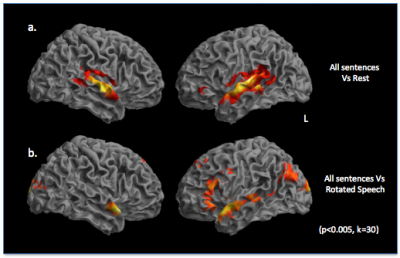Our staff and students carry out research aimed at discovering the nature and origin of language, its acquisition by children and its use in communication.

We encourage and facilitate cross-disciplinary interaction with psychologists, cognitive scientists and philosophers working on language and communication. Click on the links below for more detailed information on the research taking place in the department.
Listen to UCL Linguistics Emeritus Professor Neil Smith discuss Universal Grammar in a Guardian podcast.
BA Linguistics alumna Denise Amankwah, UCL phonologist John Harris and Geoff Lindsey have created the video 'Voices of Freedom', which explores how Africans’ resistance to slavery shaped language in the New World. Take a look at this extraordinary piece of work here:
Research Areas
- Phonetics & Phonology
Research in phonetics and phonology at UCL is aimed at a number of goals: understanding the phonological knowledge that speakers have about their language(s); developing theories to explain how this knowledge is represented in the mental grammar; understanding how such knowledge is acquired, and working out the mechanisms involved when speakers produce and perceive speech. We also wish to explain typological tendencies found in the world’s languages -- why we see certain phonological systems across many language while others are rare or non-existent -- as well as how languages develop and change over time. Our research involves analyses of a variety of languages, recently including Arrernte, Brazilian Portuguese, British Sign Language, Laurentian French, Malay, Maxakalí, Tongan, Turkish, Welsh, and others.
We employ a wide range of approaches at UCL, including linguistic description and classical theoretical analysis; experimental methods, including artificial language learning experiments, electroencephalography (EEG), perception studies, and other psycholinguistic methods; acoustic analysis; computational modeling to link theories to observed data; and corpus analysis. Much of our work also interfaces with other linguistic domains, such as morphology, syntax, and semantics.
We have regularly scheduled research talks through the London Phonology Seminar and the Laboratory for Language and Speech Diversions (LLSD). We also regularly collaborate with our colleagues in the Department of Speech, Hearing, and Phonetics Sciences.
Primary academic staff: Andrew Nevins, James WhiteOther academic staff: Kearsy Cormier
- Syntax
Syntactic research in UCL Linguistics aims to develop a theoretical model of the knowledge humans have of sentence structure and the way it interfaces with semantics, morphology and phonology. One main goal is to unearth which aspects of grammar are universal and which are subject to cross-linguistic variation.
Part of the work in syntax proper focuses on dependencies between constituents contained in sentence structures (such as predication, binding and movement). We try to find out what mechanisms underlie these dependencies and attempt to explain a range of intricate patterns in the data in terms of these mechanisms. Work in this area includes topics like ellipsis, movement interactions, reconstruction, secondary prediction, and scrambling. Another aspect of our research in syntax is concerned with word-order universals, the abstract principles that give rise to them, and the way apparent counterexamples may emerge. Work in this area includes topics like word order in the noun phrase and in verbal clusters, as well as the link between scrambling and head-finality.
A proper understanding of syntax must also include the interaction between syntax and syntax-external systems. Work on the interface between syntax and semantics includes explorations of causation, quantifier scope, phi-features (e.g. person and number features), and information structure (syntactic effects of notions like topic and focus). Work on the syntax-morphology interface includes some of the same topics (causation, phi-features), as well as distribution of phrases within words, synthetic compounds, haplology and pro-drop. Work on the interface between syntax and phonology includes the prosodic marking of focus, linearization, and adjacency.
Primary academic staff: Klaus Abels, Ad NeelemanOther academic staff: Kearsy Cormier, Andrew Nevins, Yasutada Sudo
- Semantics
Semantics concerns the properties of linguistic representations (words, phrases, sentences) relevant to conveying meaning. Research in semantics at UCL focuses on discovering these properties and how they relate to syntax and morphology, on the one hand, and broader cognitive systems for using language and reasoning about its use, on the other. To do this we use explicit formal models which can be evaluated against (cross) linguistic patterns and linked to theories of language processing and development. Recent research projects include understanding meaning flexibility (for example, in the interpretation of questions and answers), the semantic contribution of grammatical features (number, mass/count, etc.) across languages, and the role of inference and alternatives in conversation.
Primary academic staff: Richard Breheny, Nathan Klinedinst, Yasutada SudoOther academic staff: Klaus Abels, Robyn Carston, Nausicaa Pouscoulous
- Pragmatics
Pragmatics is the study of how speakers can communicate meanings (thoughts and attitudes) that go well beyond the meanings encoded by the linguistic expressions they use and how hearers are able to use contextual information to infer the speaker’s intended meanings. At UCL, we focus on research in inferential pragmatics as initiated by the philosopher Paul Grice and subsequently developed within the more cognitive-scientific perspective of Relevance Theory. Topics of recent research include: word meaning modulation in context (lexical pragmatics), non-literal communication (including metaphor, metonymy, hyperbole and irony), scalar implicature, numerical expressions, presupposition, pragmatic competence in typically and atypically developing children.
We approach our research using experimental, corpus and traditional analytic methods. Experimentally, we work with non-clinical and clinical populations across the age ranges from toddlers to adults. We use a number of experimental techniques ranging from act-out tasks and web-based surveys to eye-tracking and ERP.
UCL Linguistics has long been the leading centre for the development and application of Relevance Theory, a cognitively-based approach to utterance interpretation initiated by Dan Sperber and Deirdre Wilson. This theory has had a wide influence, not only on central topics in utterance interpretation, but also on issues in semantics, especially non-truth-conditional meaning and the conceptual/procedural distinction, the role of intentions and context in the interpretation of legal language and other prescriptive texts, the understanding of literary and poetic language, non-verbal communication, the interface of the language faculty with social cognition, and the view of the mind as a system of interacting modules. Many doctoral students from around the world have come to the department specifically to do research within this paradigm under the supervision of the leaders in this field.
Primary Academic Staff: Robyn Carston, Richard Breheny, Nausicaa Pouscoulous
Emeritus: Deirdre Wilson
Other academic staff: Alexandra Perovic, Nathan Klinedinst, Yasutada Sudo
- Psycholinguistics & Neurolinguistics
Research in Psycholinguistics/Neurolinguistics at UCL aims to understand the mental representations and processes that underlie our ability to understand and produce language, and how such representations and computations are implemented in the brain.
These are some examples of the research questions addressed at UCL:
- How are words, structures and meanings represented and processed in the brain?
- What is the nature of the processing mechanisms that allow us to understand the relations between words that are far apart from each other?
- Mary said the little girl wrote her a letter.
- The Joker knew which superhero Batman saved.
- How does our grammatical and pragmatic knowledge affect how we interpret language?
- Jenny thought that Karen embarrassed her. (“her” can refer to Jenny, but not Karen)
- The boy ate some of the cookies. (often interpreted to mean that he did not eat all of them, although grammatically possible)
There are 3 key strengths of UCL research in psycholinguistics/neurolingusitics. First, is its close relationship to linguistic theory, providing mutually beneficial interaction between experimental and theoretical linguists. Indeed, our experimental research is informed by linguistic theory and it is likewise the case in the opposite direction.
Secondly, we use a wide array of techniques to tackle the questions from multiple angles. The techniques include: eye-tracking, self-paced reading, acceptability judgment, functional magnetic resonance imaging (fMRI), and electroencephalography (EEG).
Thirdly research at UCL takes advantage of the variation across languages of the world to better understand the common cognitive processes that underlie humans’ ability to understand and produce language. To date our research includes studies on English, German, Chinese, French, Spanish, Greek, Basque and British Sign Language.
Primary academic staff: Richard Breheny, Wing Yee Chow, Andrea Santi
Other academic staff: Robyn Carston, Kearsy Cormier, Alexandra Perovic, Nausicaa Pouscoulous, James White
 Close
Close



